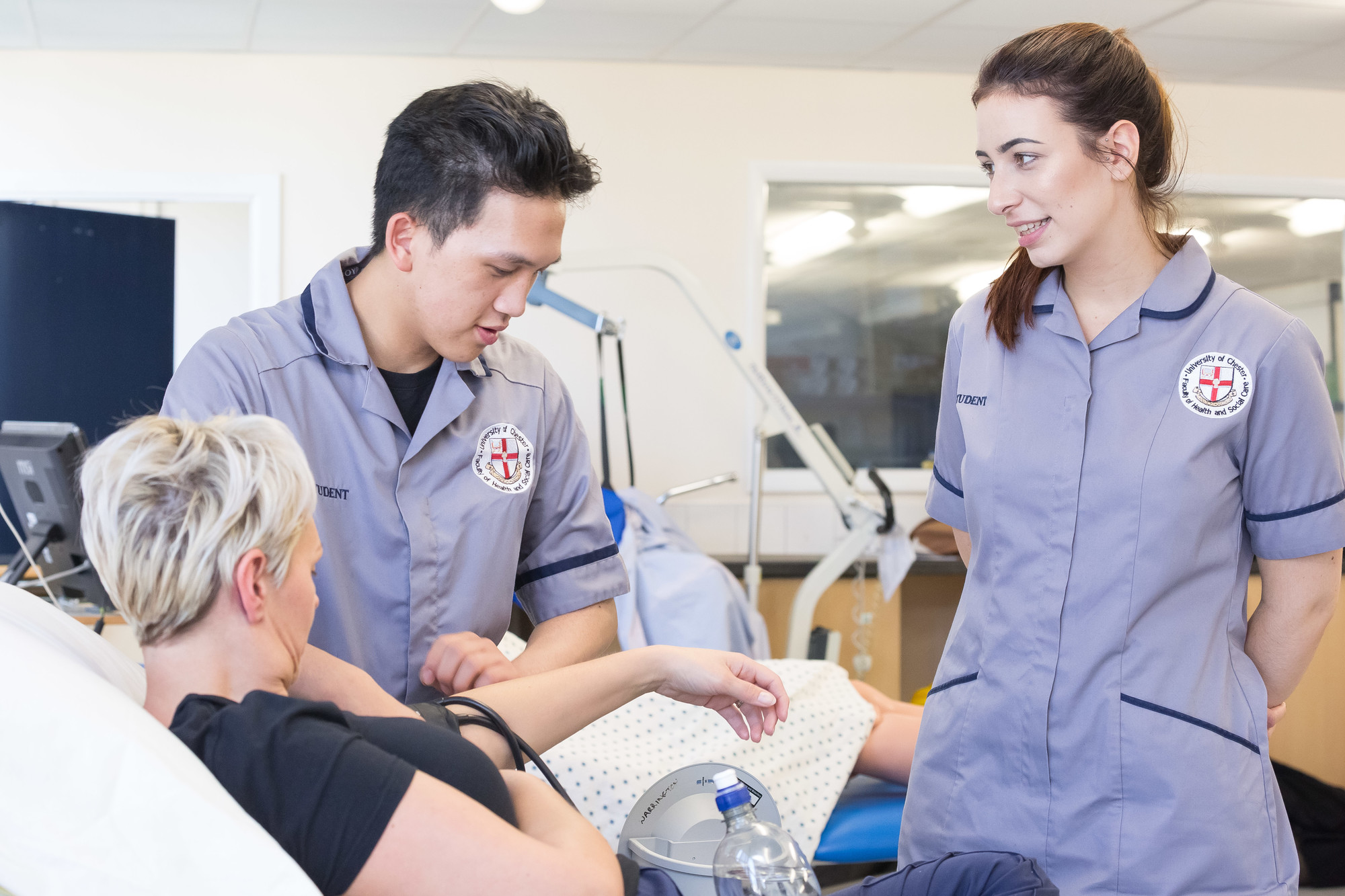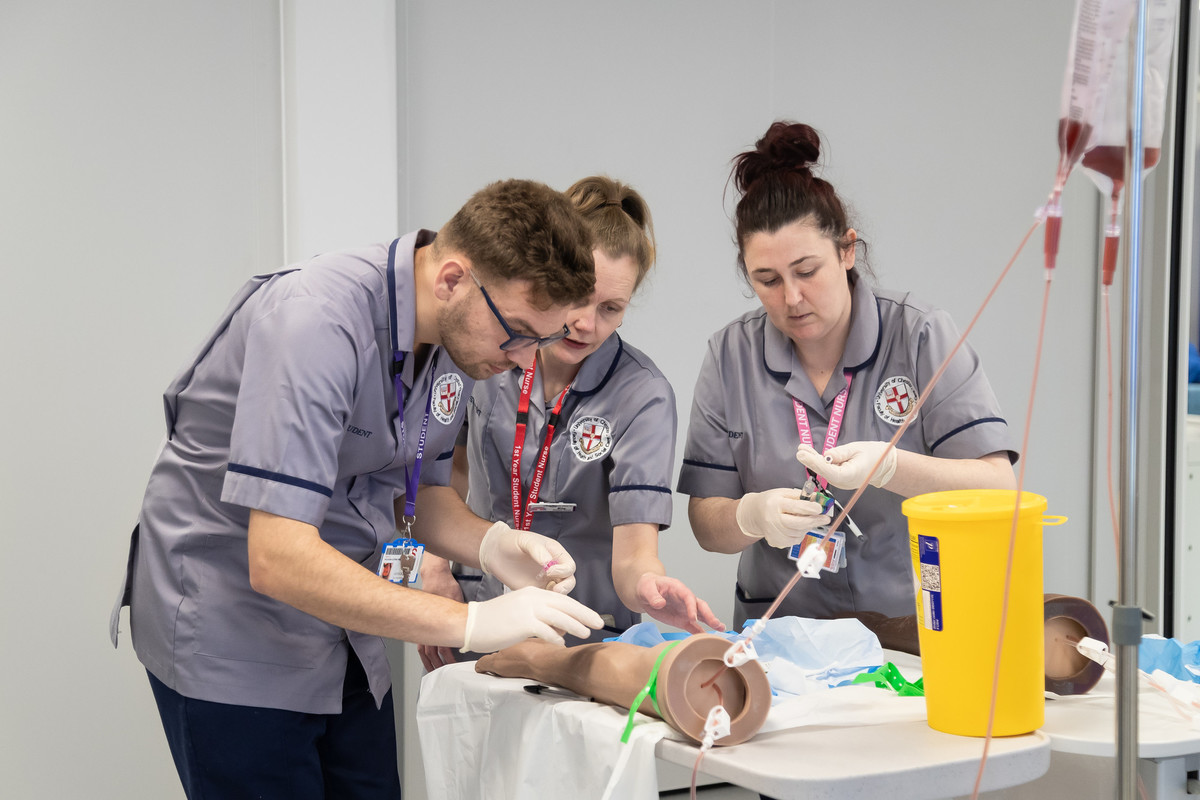Specialist Practice Community (District Nursing Pathway) MSc

This course is available with the following pathways:
- Community Children's Nursing
- District Nursing
- General Practice Nursing
- Learning Disability Nursing
- Mental Health Nursing
International/EU applicants
We are not accepting international applicants through clearing for any of the nursing programmes for Autumn 2024.
You are viewing Course summary
Course Summary
Specialist practitioners are defined as leaders who are able to exercise higher levels of judgement and discretion. This course provides student-centred and interdisciplinary opportunities for the development of a critically informed specialist practitioner in community nursing who will be instrumental in changing and developing nursing practice.
The overarching aim of our course is to produce a competent, independent community practitioner working at postgraduate level, capable of promoting the development and delivery of community nursing practice across a variety of settings.
The course is 50% theory and 50% practice and this is integrated across the duration of the course. You will undertake the theoretical component in the University, and undertake the practice component in a community setting under the supervision of a qualified Practice Assessor and Practice Supervisor from the defined area of practice.
What you'llStudy
Module content:
Module content will include:
- Literature review, knowledge of databases and other sources, searching, locating, reading, summarising, critically appraising, organising and synthesising themes.
- Identification of potential issues/problems, finding connections, formulation and testing of hypotheses, research designs, research methods, sampling, reliability and validity.
- Philosophical and methodological underpinnings, critical thinking, problem solving, logical development, data analysis, research design, strengths and limitations.
- Ethical frameworks, constraints, data protection, ethical approval, human rights, Helsinki declaration.
- Logical structure, research process, project planning with time frames. Alignment of research design and processes to research question.
- Interpretation of data, developing insights, validity and reliability, limitations of study. Critical reflection on process, critical thinking skills. Project management and review.
- Knowledge transfer, justification of recommendations and conclusions based on findings, strengths and limitations of study, dissemination e.g. seminars, workshops, conferences. Writing for publication.
Module aims:
The aims of the module are:
- To provide the student with an opportunity to investigate systematically and in depth a topic of direct relevance to his or her chosen area of application.
- To enable the student to draw on and contribute to the development of the growing body of applied knowledge and evidence-based practice.
Module content:
The RPS (2022) Prescribing Competency Framework forms the basis of the curriculum for community nurse prescribers, and has been used to inform the design and delivery of the module acting as a contextual framework to structure learning and assessment.
THE CONSULTATION (Competencies 1-6)
1: ASSESS THE PATIENT Undertakes an appropriate clinical assessment, including a medical, social and medication history including allergies and intolerances and refers to or seeks guidance from another member of the team, a specialist or a prescribing information source when necessary. Accesses and interprets all available and relevant patient records including relevant investigations necessary to inform treatment options by systematically considering a working or final diagnosis. Understands the condition(s) being treated, their natural progression and how to assess their severity, deterioration and anticipated response to treatment including adherence to and effectiveness of current medicines.
2: CONSIDER THE OPTIONS Considers both non-pharmacological (including no treatment) and pharmacological approaches to modifying disease and promoting health, including pharmacological treatment options such as optimising doses as well as stopping treatment (appropriate polypharmacy, de-prescribing). Assessing the risks and benefits to the patient/service user of taking or not taking a medicine or treatment. Applies understanding of the mode of action and pharmacokinetics of medicines and how these may be altered taking into account any relevant patient factors and the potential impact on route of administration and formulation of medicines. Identifies, accesses, and uses reliable and validated sources of information and critically evaluates other information. Stays up-to-date in own area of practice and applies the principles of evidence-based practice, including clinical and cost- effectiveness, taking into account the wider perspective including the public health issues related to medicines and their use and promoting health and understanding of antimicrobial resistance and the roles of infection prevention, control.
3: REACH A SHARED DECISION Works with the patient/carer in partnership to make informed choices, agreeing a plan that respects patient preferences including their right to refuse or limit treatment, identifying and respects the patient/service user in relation to diversity, values, beliefs and expectations about their health and treatment with medicines. Routinely assesses adherence in a non-judgemental way and understands the different reasons non-adherence can occur and how best to support patients/carers. Building a relationship which encourages appropriate prescribing which explores the patient/service users/ carers understanding of a consultation and aims for a satisfactory outcome for the patient/carer and prescriber.
4: PRESCRIBE Prescribes a medicine with up-to-date awareness of its actions, indications, dose, contraindications, interactions, cautions, and unwanted effects. Understands the potential for adverse effects and takes steps to avoid/minimise, recognise and manage them. Prescribes within relevant frameworks for medicines as a Community Practitioner Nurse Prescriber. Prescribes generic medicines where practical and safe for the patient and knows when medicines should be prescribed by branded product. Understands and applies relevant national frameworks for medicines use to own prescribing practice. Accurately completes and routinely checks calculations relevant to prescribing and practical dosing. Considers the potential for misuse of medicines, Uses up-to-date information about prescribed medicines. Only prescribes medicines that are unlicensed, ‘off-label’, or outside standard practice if satisfied that an alternative licensed medicine would not meet the patient’s clinical needs. Electronically generates or writes legible unambiguous and complete prescriptions and contemporaneous records and clinical notes of prescribing decisions. Communicates information about medicines and what they are being used for when sharing or transferring prescribing responsibilities/ information.
5: PROVIDE INFORMATION Checks the patient/service user/carer’s understanding of and commitment to the patient’s management, monitoring and follow-up giving clear and accessible information about their medicines, and how to identify reliable sources of information about their medicines and treatments. Ensures that the patient/service user/carer knows what to do if there are any concerns about the management of their condition, if the condition deteriorates or if there is no improvement in a specific time frame and where possible, encourages and supports patients/service users/carers to take responsibility for their medicines and self-manage their conditions. 6: MONITOR AND REVIEW Establishes and maintains a plan for reviewing the patient’s/service user treatment, ensuring that the effectiveness of treatment and potential unwanted effects are monitored. Detects and reports suspected adverse drug reactions using appropriate reporting systems, adapting management plans in response to on-going monitoring and review of the patient’s/service users condition and preferences.
PRESCRIBING GOVERNANCE (COMPETENCIES 7-10)
7:PRESCRIBE SAFELY Prescribes within own scope of practice from the Nurse Prescribers’ Formulary for Community Practitioners, recognising any limitations of own knowledge and skill including common types and causes of medication errors and how to prevent, avoid and detect them. Identifies the potential risks associated with prescribing via remote technology taking steps to minimise risk to support safe prescribing. Reporting prescribing errors, near misses and critical incidents, reviewing practice to prevent recurrence.
8: PRESCRIBE PROFESSIONALLY Maintains confidence and competence to prescribe, accepting accountability and responsibility for prescribing, understanding legal and ethical implications including regulatory frameworks Makes prescribing decisions based on the needs of patients, recognising and dealing with factors that might unduly influence prescribing by working within the NHS/organisational/regulatory and other codes of conduct when interacting with the pharmaceutical industry.
9: IMPROVE PRESCRIBING PRACTICE Reflects on own and others prescribing practice, and acts upon feedback and discussion, including colleagues’ inappropriate or unsafe prescribing practice using appropriate mechanisms. Understands and uses available tools to improve prescribing.
10: PRESCRIBE AS PART OF A TEAM Acts as part of a multidisciplinary team to ensure that continuity of care across care settings is developed and not compromised, establishing relationships with other professionals based on understanding, trust and respect. Negotiates the appropriate level of support and supervision for role as a Community Practitioner Nurse prescriber and provides support and advice to other prescribers or those involved in administration of medicines.
Module aims:
The aims of this module are:
- To prepare postgraduate students to attain the RPS (2022) Prescribing Competency for community nurse prescribers, for safe, cost-effective prescribing from the Community Practitioner Formulary, within their sphere of practice.
- To enable postgraduate students to demonstrate professional accountability, responsibility and governance when reaching a negotiated prescribing decision in patient consultation.
Module content:
Module content will include:
- Frameworks of analysis, values, beliefs, attitudes, self-awareness, personal motivation, mind mapping and personal action planning, and developing a vision for future direction. Reflective practice. Sources of expertise in practice. Action learning techniques. NHS Leadership academy. 360° leadership assessment.
- Theories and models of leadership and management, including situational, transformational and transactional leadership styles. The impact of reorganisation of health and social care services, including the influences of policy and organisational culture.
- Change management theory; tools for analysing change e.g. force field analysis, drivers and levers of change; project management skills designed, for example, to achieve specific developments innovations and improvements in organisational systems, or in the health and wellbeing of the population. Working across organisational boundaries; formulating bids for service development; and economic influences on service provision including commissioning and the development of social enterprise.
- Patient/client/service user participation models, advocacy, empowerment and partnership working. Leadership at the point of care.
- Team analysis across agencies and disciplines including team development, team leadership, team participation, and implementation of change relative to partnership working and health and wellbeing, Belbin’s team role analysis, business planning, managing conflict in teams.
- Development of specific roles and responsibilities in practice including accountability, delegation and conflict resolution techniques; time management; influencing and negotiating skills and conflict resolution with key stakeholders and agencies, budget management, staff discipline issues, investigating and managing complaints.
Module aims:
The aims of the module are to prepare students to lead and construct practical solutions for specialist community practice through:
- Comprehensive application of policy frameworks and guidance to contemporary leadership in specialist community and public health practice.
- Synthesis of contemporary leadership and change theories and models to community and public health practice.
- Identifying personal leadership qualities in preparation for leading and managing others.
- Collaborative and partnership working to enhance and protect the health of populations Leading and managing others.
Module content:
Generic module content will include:
- Reflection, continuous assessment and evaluation; academic writing and presentation skills; personal awareness; professionalism; confidence and competence.
- Advanced clinical and communication skills, measuring impact and enhancing the patient experience; relationships and community networks; end of life care; early intervention to optimise and maximise health and wellbeing strategies in line with pathway specific for specialist practice community nursing.
- Completion and assessment of the practice learning portfolio to demonstrate application of theory to practice by addressing specialist practice community nursing competencies.
- Demonstrating achievement of competence and professional development through formative and summative assessment.
Module aims:
The aims of this module are to:
- Provide maximum potential for study in specialised areas within a rigorous and structured framework for learning.
- Provide students with the opportunity to apply and develop the subject specific skills and knowledge required for their individual progress.
Module content:
Module content will include:
- Theoretical definitions and concepts of public health, health improvement and wellbeing. Emerging public health themes, key policies and strategies in place that influence the health improvement and wellbeing agenda, including global and national policies and research.
- Understanding epidemiology. Application of epidemiological evidence at national and local policy levels, to include utilisation of data in the assessment and identification of need. How health inequalities and challenges to health and wellbeing of populations, communities and individuals are determined, measured and evaluated. The concept of social justice.
- Commissioning processes and impact on health improvement and wellbeing. Knowledge of the commissioning cycle, the short- and long-term challenges to improving health and wellbeing, and reducing health and social inequalities. The commissioning cycle including the identification and assessment of need, planning, and implementing and evaluating health and wellbeing strategies and outcomes in terms of health gain and the effective use of resources. Utilisation of health impact assessment strategies.
- Stakeholders and partnership roles. Understanding the complex roles that stakeholders play in relation to strategic planning in partnership with service users, statutory and voluntary agencies, and the private sector in improving health and wellbeing.
- Understanding how communities are developed and sustained in relation to individuals and populations, and their role in reducing inequalities within a diverse and multicultural society. Knowledge of engagement, empowerment and advocacy approaches in relation to community development will be explored.
- Skills in health improvement and wellbeing. Assessing, planning, implementing and evaluating public health, health promoting and prevention programmes at strategic and local levels. Includes lifespan approaches, working with the media.
Module aims:
The aims of this module are to:
- Provide students with a comprehensive foundation in health improvement and wellbeing from an inter-professional and multi-stakeholder perspective.
- Promote learning and teaching that will encompass the themes of health promotion, public health, epidemiology, disease prevention, and health and disease management in the context of sustainable communities and long term health gain.
- Promote working in partnership with individuals, communities and populations with the aim of empowering people to play an active role in decisions that affect their lives and local communities, and of being an advocate to develop confidence and enable more people to actively participate.
Module content:
Module content will include:
- Research and professional practice: Evidence-based practice, benchmarking, audit, evaluation, practice development and research, research methodologies.
- Key concepts and issues in social and behavioural research: Research topics and research questions, answering questions with data, validity and reliability of data, qualitative and quantitative data, description, exploration, finding connections, formulating and testing hypotheses, populations and sampling, phenomenology and positivism.
- Research traditions and designs: Ethnography, survey, experiment, mixed method, research process.
- Gathering and analysing data: Observation, questionnaires, interviews, psycho-bio-metrics. Data analysis and drawing conclusions.
- Literature review: Searching, locating, reading and summarising, reviewing and critiquing, organising, synthesising, and using the literature.
- Preparing the research proposal: Identifying research questions for chosen topic. Designing a study to address the questions. Data gathering and recording, data analysis. Considering alternative approaches: Critical analysis of alternative methods of research to the chosen approach.
- Ethical frameworks, constraints, data protection, confidentiality, human rights, Helsinki declaration.
Module aims:
The aims of this module are to:
- Provide a comprehensive introduction to social and behavioural research with regard to key concepts, approaches, and techniques.
- Facilitate the preparation of a research proposal for the dissertation.
- Enable students to identify the strengths and weaknesses of different approaches to their research topic.
Module content:
Module content will include:
- Theories of therapeutic practice, definitions and concepts of safeguarding and vulnerability within international, national and local policy frameworks.
- Impact of social exclusion on diversity and equity, tackling stigma and promoting social inclusion, including sexuality, gender, disability, ageism and race.
- The interpretation and impact of diversity and inequality, and their relation to vulnerability.
- Decision-making skills, developing communication strategies with a range of vulnerable groups across diverse populations.
- Promoting social inclusion, engagement with vulnerable groups including early identification and solution-focused intervention, effective prevention strategies, empowerment and evaluation.
- Mechanisms and strategies for the appropriate escalation of concerns.
Module aims:
The aims of this module are to:
- Provide a comprehensive introduction to the concept of risk within society and its significance for different professional groups, whilst embracing the concepts of risk assessment and management.
- Encourage synthesis within a range of risk management strategies and explore their relevance to vulnerable and diverse groups and populations.
Module content:
Module content will include:
- Knowledge, skills and attributes required for the professional role including communication, population and caseload management, and evidence-based practice. Managing and leading an active caseload and providing population interventions to improve community health and wellbeing.
- Theories, models and paradigms underpinning district nursing/nursing in the home, and the purpose of the role.
- Development, organisation and management of professional practice within the health and social care agenda. Application of national and local policies.
- Collaborative partnership working with patients and carers to ensure safe joint decision making and patient-centred care. Working with a range of health and social care partners (including GPs, the voluntary sector and community services) to provide services for adults with complex conditions and their carers, at home and in other community settings. Primary care team roles, personal and professional boundaries, clinical governance and working within the mixed economy of welfare.
- Professional, legal and ethical implications of professional practice including patient empowerment, advocacy, accountability, confidentiality, the role of statutory bodies, and assistive technology to include telehealthcare/telemedicine. Support and care for independence.
- Care and programme management strategies, to include proactively planning and implementing health sustaining and enhancing strategies for individuals, carers, groups and communities. End of life care provision.
Module aims:
The specialist practitioner in district nursing plays a pivotal part in assessing, providing, and evaluating care to patients and their carers in the community environment. This module examines the key theoretical concepts which underpin the role of the specialist practitioner in district nursing/community nursing in the home, within the related professional and competency frameworks.
This module aims to:
- Enable students to develop systematic understanding of the theory and practice which underpin district nursing.
- Empower students to attain the professional and clinical skills which encompass the competency framework for district nursing, which in turn will enable them to lead future innovations in practice.
- Enable students to maximise the unique contribution of district nursing to high quality, holistic, compassionate care, and to optimise health and wellbeing outcomes for all people cared for in their home environment.
Module content:
Negotiation of tripartite agreement of learning experience(s) based on in-service staff development activities cited in the agreement. Specific content will relate to area of practice stated within the tripartite agreement. Generic content areas will include: Generic content areas will include: Critical analysis and interpretation, critical reflection, evaluation and assessment, critical self evaluation and personal awareness, strategy and policy development; multi-disciplinary working; professional accountability.
Module aims:
In response to national and local initiatives aimed at widening access to higher education and improving levels of service and capability within organisations, (e.g. NHS, local authorities, public and private sector agencies), there is a significant amount of taught and work-related learning materials and short programme provision to enable practitioners to develop and enhance their roles. These materials are being utilised in traditional and non-traditional methods and may include e-learning, open learning and in-house service programmes. These resources can offer a significant response to change and development initiatives, individual pathways of competence building and developing skills in the practice environment. To support these developing skills there is an opportunity for academic credits to be gained through these learning experiences where they are linked into, and supported by, formal academic mechanisms so providing academic veracity to learning.
- To provide maximum potential for study in specialised areas, whilst providing a rigorous and structured framework for learning.
- To give students the opportunity to apply and develop subject specific skills and knowledge required for their individual progress.
Practice is assessed via a Practice Learning Portfolio under the supervision of a practice assessor/supervisor and academic assessor.
Modules are assessed in a variety of ways, e.g. examinations, assignments, presentations, oral examination and portfolio.
There is also the opportunity for the pathway lead to visit you and your practice assessor/supervisor to aid learning and support. This will allow you to reflect upon your practice and to show progression within the SPC programme.
Entry Requirements
Applicants must be registered on the appropriate part of the NMC Register for their chosen pathway. Normally, practitioners will have a minimum of two years' relevant post-registration experience and support from a sponsoring trust or organisation, and evidence of practice in a closely related area of specialism. Applicants must also have successfully completed an honours degree in Nursing or a health-related field, or equivalent.
Applicants must have successfully completed or are undertaking completion of a Level 6 Mentorship module.
This course is not open to international students.
Fees and Funding
£9,630 for the full course (2024/25)
Guides to the fees for students who wish to commence postgraduate courses are available to view on our Postgraduate Taught Programmes Fees page.
Your course will involve additional costs not covered by your tuition fees. This may include books, printing, photocopying, educational stationery and related materials, specialist clothing, travel to placements, optional field trips and software. Compulsory field trips are covered by your tuition fees.
If you are living away from home during your time at university, you will need to cover costs such as accommodation, food, travel and bills.
There will be a requirement to travel to clinical placements. Health Education England provide financial support for this. Please visit their website for additional information.
The University of Chester supports fair access for students who may need additional support through a range of bursaries and scholarships.
Full details, as well as terms and conditions for all bursaries and scholarships can be found on the Fees & Finance section of our website.
Your future Career
Careers service
The University has an award-winning Careers and Employability service which provides a variety of employability-enhancing experiences; through the curriculum, through employer contact, tailored group sessions, individual information, advice and guidance.
Careers and Employability aims to deliver a service which is inclusive, impartial, welcoming, informed and tailored to your personal goals and aspirations, to enable you to develop as an individual and contribute to the business and community in which you will live and work.
We are here to help you plan your future, make the most of your time at University and to enhance your employability. We provide access to part-time jobs, extra-curricular employability-enhancing workshops and offer practical one-to-one help with career planning, including help with CVs, applications and mock interviews. We also deliver group sessions on career planning within each course and we have a wide range of extensive information covering graduate jobs .



